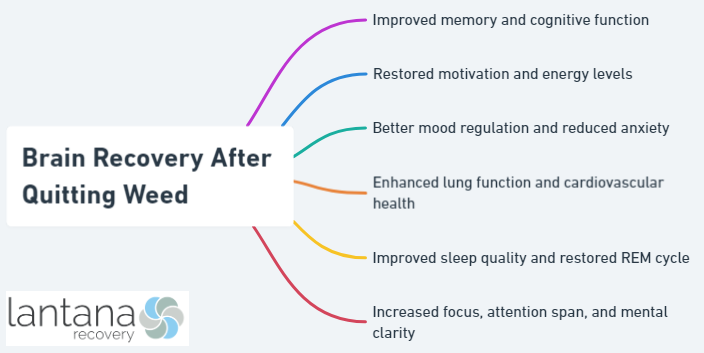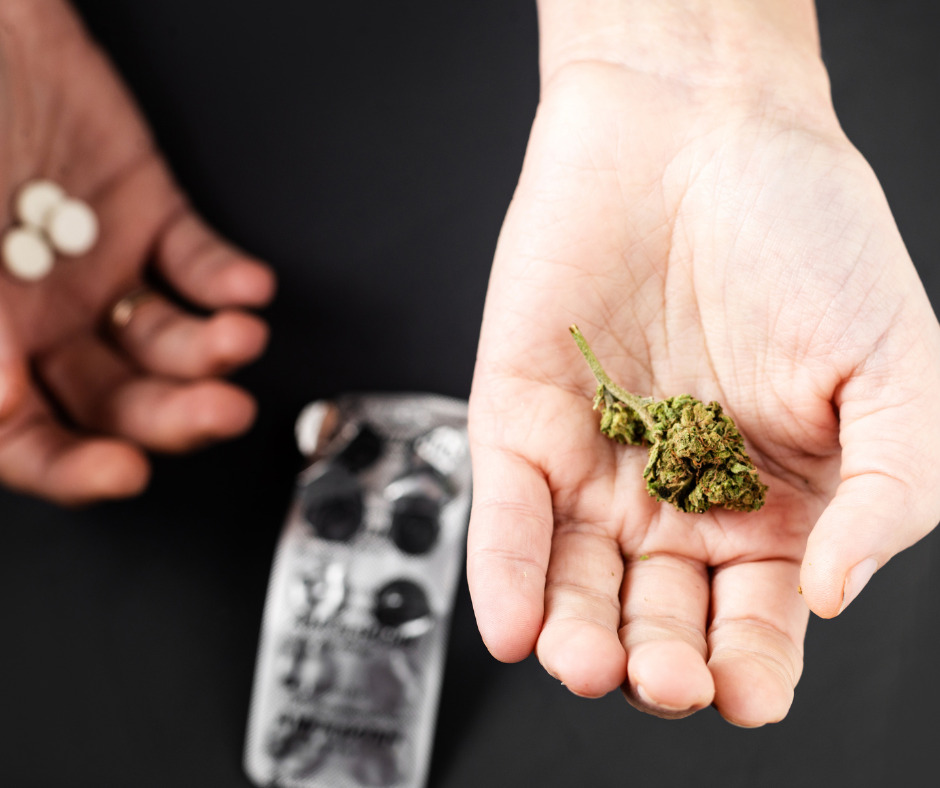Key takeaways:
- Regular consumption of recreational marijuana can have negative impacts on the human brain and behavior, including cognitive deficits, memory loss, irritability, and difficulty maintaining focus.
- Quitting marijuana can lead to short-term withdrawal symptoms such as trouble sleeping, irritability, and loss of focus or motivation, but these are generally temporary and will subside as the brain heals.
- Over the long term, quitting marijuana can have positive effects on brain function and volume recovery, reversing some of the changes caused by chronic marijuana use.
- The benefits of quitting marijuana include increased energy and motivation, improved ability to focus, memory improvements, and a positive and balanced mood.
- Cognitive-behavioral therapy (CBT) and other therapies with us can be effective treatments for marijuana addiction, and medication may be prescribed to manage withdrawal symptoms and cravings.
- Recovery from cannabis use may take a few days to a couple of weeks, so patience and self-compassion are important during the process. Lantana Recovery offers holistic treatment for alcohol and drug abuse to support addiction recovery.
If you’ve ever struggled with cannabis addiction, you know how challenging it can be to break free from the clutches of weed. But have you ever stopped to consider just how much your brain might benefit from quitting cannabis?
Research suggests that quitting marijuana can actually help reverse some of the brain damage caused by marijuana use and restore brain functioning to normal levels. So if you’re looking to kick your habit and heal your brain, then read on to learn more about the incredible benefits of quitting weed on your brain.
Negative Effects Of Smoking Marijuana
Although many states in America have legalized marijuana for medicinal as well as recreational purposes, that doesn’t deny the negative impacts, regular consumption of recreational marijuana can have on the human brain and behavior.
Like in any other substance use disorder, young adults who regularly consume marijuana are at a greater risk of developing an addiction to an illegal drug or alcohol. As the brain adapts to the continuous supply of cannabis, it demands a higher dosage to feel normal in the same way as alcohol does.
As a result, people often tend to turn to prescription drugs or alcohol to trigger the release of neurotransmitters in the brain. Thus leading them to develop substance use disorder.
Some common side effects of marijuana use are:
- Cognitive deficits
- Memory loss
- Irritable and anxious behavior
- Difficulty to maintain focus
Impacts Of Quitting Marijuana On Our Brain
Stopping cannabis use can have a significant impact on the brain, both in the short- and long term. In the short term, quitting marijuana can cause some withdrawal symptoms such as trouble sleeping, irritability, and loss of focus or motivation.
In addition, some people experience physical effects such as headaches or dizziness. However, these side effects are generally temporary and will subside as the brain begins to heal from drug use.
Over the long term, quitting marijuana has been shown to have positive effects on the brain’s ability to function normally as well as positively affect brain volume recovery. Studies have shown that chronic exposure to marijuana use can lead to changes in the orbitofrontal cortex the area of the brain associated with attention, emotion regulation, and decision making.
However, researchers suggest that many of these effects can be reversed or improved upon by quitting cannabis use and allowing time for key neural pathways to develop. Overall, abstinence from cannabis use is an important step toward protecting mental and physical health, both now and in the future.

Benefits Of Quitting Marijuana
We all know that smoking weed can have some adverse effects on the brain. For example, some people reported experiencing cognitive deficits such as short-term memory problems, difficulty concentrating, brain fog, and mental health disorders such as anxiety and depression as side effects of regular marijuana use. “After substance use is initiated, alcohol and marijuana use is associated with poorer cognitive functioning on tests of verbal memory, visuospatial functioning, psychomotor speed, working memory, attention, cognitive control, and overall IQ” (Alcohol and Drug Use and the Developing Brain, Squeglia & Gray, 2016.)
However, what many people don’t realize is that these effects are only temporary. As soon as you quit smoking, your brain starts to recover.
The first thing that happens is when someone starts their recovery journey from recreational marijuana, they will notice some positive changes in their brain functioning, such as an increased attention span, and improved problem-solving ability.
Increased Energy And Motivation
Quitting cannabis use can increase your energy levels and motivation. This is because THC, the main psychoactive compound in cannabis, binds to the brain’s CB1 receptors. These receptors are responsible for regulating mood, memory, sleep, and appetite.
When THC binds to these receptors, it can lead to feelings of fatigue and lethargy. However, when you quit marijuana, THC is no longer able to bind to the CB1 receptors. This allows the receptors to function normally again and can increase energy levels and motivation.
Additionally, quitting cannabis can also help improve your sleep quality. This is because cannabis use can disrupt the body’s natural sleep cycle. By quitting cannabis, you can restore your natural sleep cycle and feel more rested during the day. This can also lead to increased energy levels and motivation.
An Improved Ability To Focus
One of the major benefits of abstinence from marijuana is that it can have a major impact on your ability to focus and concentrate. This is because the active ingredient in marijuana, THC, acts directly on brain cells, triggering the release of dopamine and altering connections between these neurons. These changes can cause long-term disruptions in normal functioning, leaving users feeling groggy and unfocused.
However, according to research published in Drug and Alcohol Dependence, by eliminating THC from the system, you can significantly improve your ability to focus and perform tasks that require concentration and mental agility. Studies have also shown that doing so can even cause structural changes in brain areas responsible for feelings of reward, motivation, and habit formation, further boosting your attention and drive.
So if you’re looking to enhance your ability to focus and concentrate, giving up marijuana can be an effective way to do so. With consistent effort and support from friends and family members along the way, it is possible to achieve lasting results and reclaim a state of optimal mental sharpness.
Memory Improvements
According to research conducted by the Massachusetts General Hospital, young adults who practice abstinence from weed for up to 4 weeks, reported an improvement in memory and information retention. After the 4th week of the research, the urine test results showed that up to 85% of the participants quit using marijuana altogether.
This is because the THC levels in weed affect the part of the brain responsible for short-term memory. Quitting allows this part of the brain to start functioning properly again even in just one week of no marijuana use.
One of the most common side effects of marijuana use is short-term memory loss. This is because THC, the active ingredient in marijuana, binds to receptors in the hippocampus, which is responsible for forming new memories.
However, THC also disrupts the way in which information is stored in the hippocampus, making it difficult to recall recent events. Quitting pot can help to improve memory by reducing the amount of THC in the brain and allowing the hippocampus to function more effectively.
In addition, quitting cannabis can also help to improve focus and concentration, both of which are essential for good memory function.
Positive and Balanced Mood
There is a lot of evidence that suggests that giving up weed can have a positive impact on mood and mental health. Researchers at Harvard Medical School suggest that cannabis use has been linked to increased symptoms of depression, anxiety, and other psychological disorders.
In particular, chronic or heavy marijuana use has been shown to decrease levels of dopamine in the brain – an important neurotransmitter associated with feelings of pleasure and reward. By breaking this utilization loop, individuals are better able to regulate their emotions and handle stress more effectively.
Furthermore, many former marijuana users experience an overall improvement in sleep quality as well as an increase in energy levels and motivation, resulting in improved overall well-being. Overall, the benefits of quitting cannabis are pivotal for those looking to manage or improve their moods and mental health.
Individuals who are still in school can definitely benefit from stopping the use of recreational weed to improve their grades.
Marijuana Withdrawal Symptoms

When someone decides to quit smoking marijuana, it is not uncommon for them to experience withdrawal symptoms, especially during the first week. The symptoms during the first week can be;
- Headaches
- Nausea
- Anxiety
- Depression
- Vivid dreams
- Irritability
- Trouble sleeping
In many cases, these symptoms will be mild and will go away on their own within a few weeks.
However, some regular users have experienced more severe withdrawal symptoms due to increased and prolonged exposure to marijuana. If you are a regular user and trying to quit weed and experiencing these symptoms, it is important to seek out treatment from a healthcare professional who can help to manage your symptoms and support your efforts in quitting.
Marijuana Addiction Treatment
Marijuana addiction is a real problem for many people especially young adults in high school. Although it is not as well-known as other substance abuse disorders, it can be just as debilitating. Fortunately, there are treatment options available for those who are struggling with marijuana addiction.
Cognitive Behavioral Therapy (CBT)
One of the most effective treatments is cognitive-behavioral therapy (CBT). CBT helps individuals to identify the negative thoughts and behaviors that contribute to their addiction, and then replace them with healthier coping mechanisms. Other therapies with us that may be used include motivational interviewing and contingency management, which provide rewards for abstinence from drug use.
Medication
In some cases, medication may also be prescribed to help manage withdrawal symptoms and cravings. Ultimately, the best treatment plan for each patient will be based on their individual needs and preferences. However, with commitment and effort, it is possible for anyone to overcome their dependence on marijuana.
If you or someone you know is struggling with addiction recovery, we at Lantana Recovery offer holistic treatment for alcohol and drug abuse under the supervision of our highly trained and experienced staff. Contact us today to start the difficult but highly rewarding process of healing from drugs! Emerging evidence suggests that such interventions can be effective in promoting cognitive recovery in persons with AUD and other substance use disorders, and potentially increasing the efficacy of treatments.
Bottom Line
So, what have we learned? If you’re trying to give your brain a break from cannabis, make sure you allow yourself time for adequate recovery. Depending on how much and how often you smoked, it could take anywhere from a few days to a couple of weeks for your brain to start returning to its normal state.
During that time, be patient with yourself – avoid stressors as much as possible and give yourself time to relax. And most importantly, don’t beat yourself up if you slip up! Every day is another opportunity to learn and grow.
Don’t forget, we at Lantana are always here to help!








